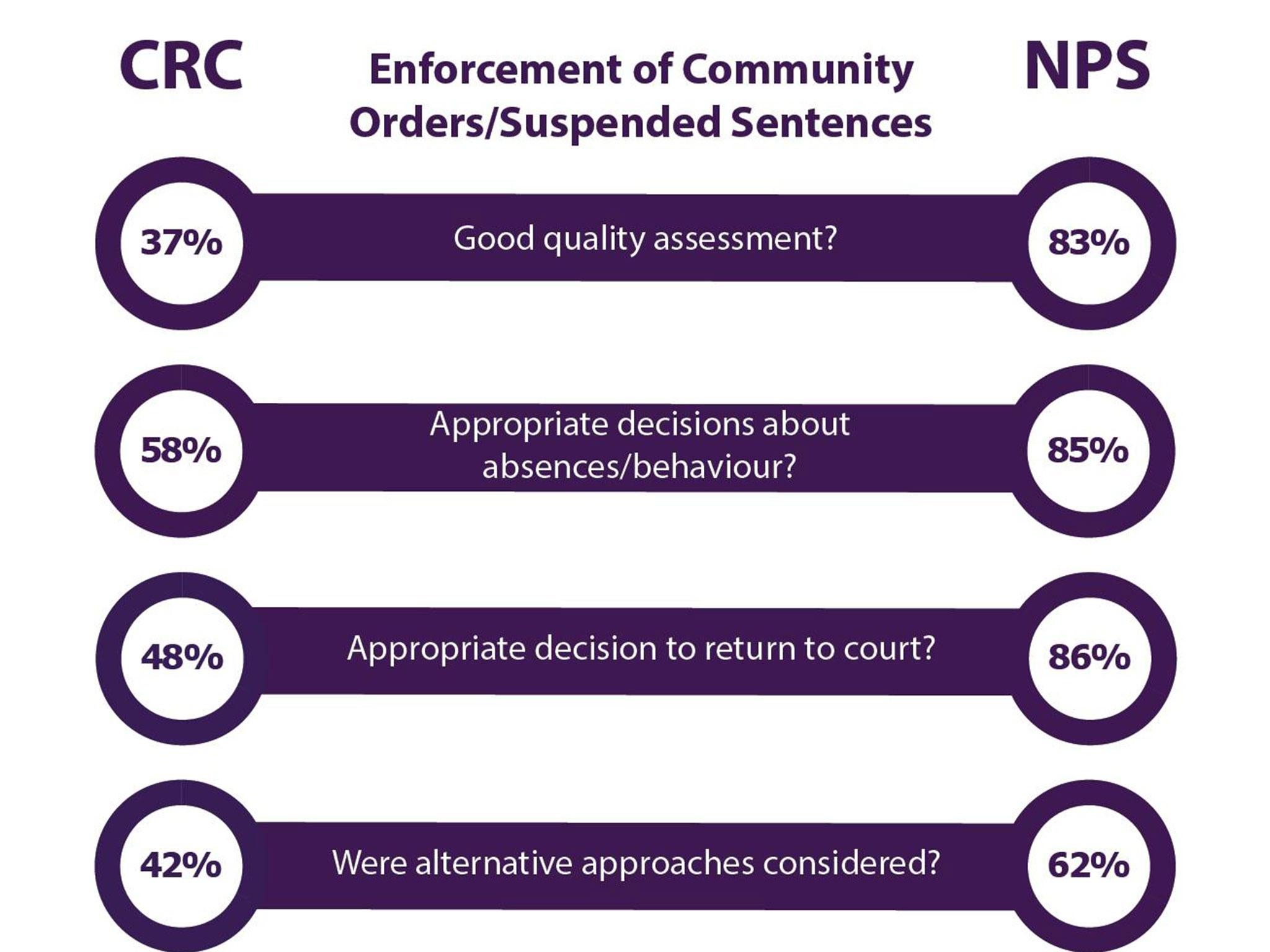Probation services renationalised after ‘disastrous’ part-privatisation by Chris Grayling
Unpaid work and behaviour programmes handed out as part of community sentences to be run by government body

Your support helps us to tell the story
From reproductive rights to climate change to Big Tech, The Independent is on the ground when the story is developing. Whether it's investigating the financials of Elon Musk's pro-Trump PAC or producing our latest documentary, 'The A Word', which shines a light on the American women fighting for reproductive rights, we know how important it is to parse out the facts from the messaging.
At such a critical moment in US history, we need reporters on the ground. Your donation allows us to keep sending journalists to speak to both sides of the story.
The Independent is trusted by Americans across the entire political spectrum. And unlike many other quality news outlets, we choose not to lock Americans out of our reporting and analysis with paywalls. We believe quality journalism should be available to everyone, paid for by those who can afford it.
Your support makes all the difference.Unpaid work and behaviour programmes for convicts have been renationalised by the government in its latest U-turn on the 2014 Transforming Rehabilitation programme.
The controversial reforms, implemented by Chris Grayling, split probation work between the public National Probation Service (NPS) and private companies.
A series of damning reports by parliamentary committees and watchdogs found the restructure put public safety at risk and was “irredeemably flawed”.
In its first climbdown in 2018, the government proposed reducing the number of Community Rehabilitation Companies (CRCs) and reforming their contracts, but then in May last year it announced that the supervision of released prisoners would be renationalised.
Private companies were invited to bid to become “probation delivery partners” for unpaid work and behavioural programmes, such as those for sex offenders and domestic abusers.
But on Thursday, the justice secretary announced the scheme had been scrapped after the coronavirus pandemic caused the government to “reassess” its plans.
“The delivery of unpaid work and behavioural-change programmes will be instead brought under control of the NPS alongside offender supervision when current CRC contracts end in June of next year,” Robert Buckland told MPs.
”This will give us a critical measure of control, resilience and flexibility with these services that we would not have had were they delivered under 12 contracts with a number of organisations.
“We can reassure the judiciary and the public that whatever lies ahead, offenders serving community sentences will be punished and make their reparation to society and that programmes to address their behaviour will be delivered.”
Charities and private companies are still being invited to bid for £100m in annual funding to run other services, such as education, employment, accommodation and addiction treatment.
“The private sector will continue to play a key role in rehabilitating offenders, from specialist support services and operating prisons through to tagging and the job offers they give to those leaving jail,” Mr Buckland said.
About 2,000 staff are expected to be transferred from abolished CRCs to HM Prison and Probation Service when the switchover happens in June next year.
Probation services supervise more than a quarter of a million offenders in England and Wales, including inmates preparing to leave jail, ex-prisoners living in the community and people serving community or suspended sentences.
Mr Grayling handed the monitoring of low and medium-risk offenders over to private firms 2014 in spite of warnings from officials, experts and charities.
The Transforming Rehabilitation programme aimed to reduce reoffending and save money, but the government was forced to bail out failing companies and cancel contracts early in moves that were expected to cost taxpayers more than £467m.
It saw 35 probation trusts replaced by the NPS and 21 privately-owned CRCs, which were found to be failing to properly supervise convicts in the “two-tier” system.
Inspectors found the companies were monitoring offenders over the phone and failing to properly assess the risk posed by criminals, or protect their victims.
A “skyrocketing” number of criminals have been recalled to prison and more than 200 offenders supposedly being monitored by CRCs have been charged with murder, while others have committed serious offences or disappeared.
In one damning report, the Public Accounts Committee said the reforms were pushed through at “breakneck speed”, failed to reduce reoffending and left services “underfunded, fragile, and lacking the confidence of the courts”.
David Lammy, Labour’s shadow justice secretary, called for the government to apologise for the “disastrous” changes. Speaking in the House of Commons, he added: “The government wants to frame these reforms as purely down to the coronavirus but we all know the truth.”
”The problems are much deeper than that“, he said, adding that the Conservatives had been warned about the ”devastation” part-privatisation would cause.

HM Inspectorate of Probation warned that the changes would not be a “magic bullet” for improving performance.
Chief inspector Justin Russell said there were “fundamental flaws” in the original contracts that starved CRCs of funding and affected the quality of their work.
“The probation service must be properly funded,” he added. “The quality of probation supervision will not improve merely by lifting and shifting large volumes of cases from CRCs back into the NPS next year.”
Amid understaffing, he warned that vacancies for probation officers should be filled with properly trained staff.
The Reform campaign group said it would be a “huge challenge” for the NPS to take on the extra work. Its researcher Aidan Shilson-Thomas added: “Previous reforms have been rushed, and the next steps must be taken carefully.
“The government must not make the same mistake of under-investing, which crippled the current model, and avoid over-burdening probation services with unnecessary centralisation.”